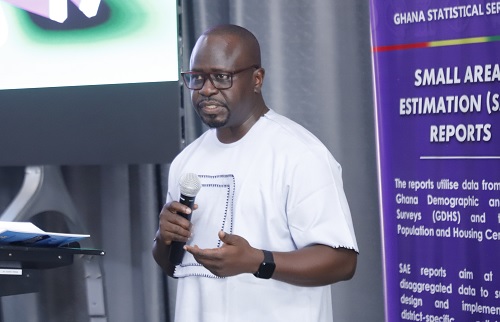One in every 10 adolescent girls aged 10 to 19 had sexual intercourse before turning 15 as of 2022, a study by the Ghana Statistical Service (GSS) has established.
The study, extracted from the 2022 Ghana Demographic and Health Survey (GDHS), reported that the figure represented 10.2 percent of the adolescent population, which constitutes 22 percent of the country’s total population.
Although the proportion of adolescent girls who initiated sexual intercourse before turning 15 declined by 2 percent over 29 years, from 12 percent in 1993 to 10.2 percent in 2022, the improvement was considered negligible, given the numerous education programs implemented over the years to address the implications of early sexual activity.
The statistics, dubbed “Adolescent Risky Behaviour,” were released by the Government Statistician, Prof. Samuel Kobina Annim, at a forum in Accra. The findings indicated that 15.2 percent of teenage girls had ever been pregnant, 4 percent had experienced a pregnancy loss, and 10.9 percent were mothers.
The report also showed an increase in the prevalence of sexually transmitted infections (STIs) among female adolescents aged 15 to 19, rising from 2.2 percent to 7.1 percent between 2003 and 2022. Among male adolescents aged 15 to 19, STI prevalence also increased from 2.2 percent to 12.5 percent during the same period.
According to the Ghana AIDS Commission, in 2022, adolescents aged 10 to 19 made up 6 percent of the HIV population, with 10.8 percent (1,791) of new HIV infections occurring within this group.
Underage Sexual Activity
The study further indicated that underage sexual activity and multiple sexual partners were becoming serious concerns in society, with higher prevalence rates among female adolescents compared to males.
Nine out of the 10 districts with the highest prevalence of young adolescent females having sex before age 16 were in the Ashanti Region. These included Akrofuom (42.07 percent), Amansie South (41.4 percent), Amansie Central (40.97 percent), Amansie West (40.2 percent), and Adansi Asokwa (39.5 percent).
Other districts making up the top 10 were Adansi South (39.1 percent), Asante Akim South (38.3 percent), Bosome Freho (38.2 percent), and Ahafo Ano South East (37.7 percent), with only Bia East from the Western Region at 37.9 percent making the list.
The report also noted that about one in every three adolescent boys aged 16 to 19 years had sex before 16 years in the top 10 districts with the highest prevalence of underage sexual activity.
All 33 districts in the Eastern Region made up the top 33 districts with the highest prevalence of adolescent males having sex before age 16. Leading the list were Upper Manya Krobo (35.7 percent), Atiwa West (35.0 percent), Upper West Akim (34.5 percent), Suhum (34.0 percent), and Kwahu Afram Plains (34.0 percent).
Multiple Sexual Partners
The report also indicated that districts in the Bono and Western North Regions had the highest prevalence of females aged 15 to 19 years engaging in sexual intercourse with multiple partners, either consecutively or concurrently, in the last 12 months. Dorma East District in the Bono Region topped the chart with a prevalence rate of 38.7 percent, followed by Dorma Central (37.7 percent), Bibiani Anhwiaso Bekwai from Western North (37.5 percent), and Sefwi Wiawso (37.4 percent).
Other districts in the top 10 included Berekum East (37.3 percent), Berekum West (36.9 percent), Juaboso (36.8 percent), Jaman South (36.5 percent), Dormaa West (36.0 percent), and Suaman (35.8 percent).
For adolescent males aged 15 to 19 years having multiple sexual partners, the Oti Region topped the chart, with all of its nine districts making the top 10. The Guan district led with 36.3 percent, followed by Nkwanta South (35.4 percent), Krachi West (35.0 percent), Krachi Nchumuru (35.0 percent), and Jasikan (34.3 percent).
Education
In an interview with the Daily Graphic, the Executive Director of Child Rights International, Bright Appiah, described the situation as worrying and called for heightened education to address this concerning trend. Mr. Appiah expressed his fear for the future of children in the country, saying, “If the necessary measures are not taken in time, within the near future, our children are going to encounter serious health implications.”

ALSO READ:

